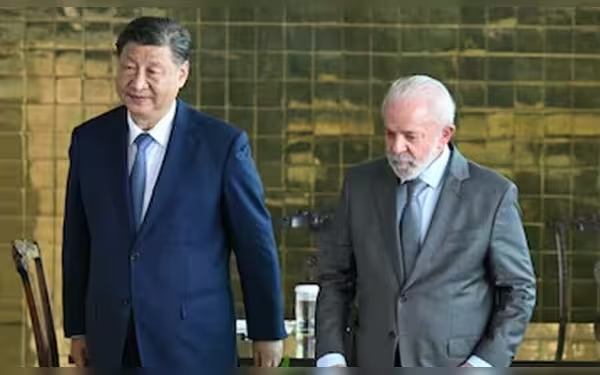Sunday, November 24, 2024 01:01 AM
Lula and Xi Prioritize Peace Amid Global Conflicts
- Lula and Xi emphasize peace and diplomacy.
- Brazil and China sign key cooperation agreements.
- Bilateral trade between Brazil and China exceeds $160 billion.
 Image Credits: brecorder
Image Credits: brecorderLula and Xi prioritize peace and cooperation during Xi's visit to Brazil, signing key agreements amid global conflicts.
In a world increasingly marked by conflict and political turmoil, the recent state visit of Chinese President Xi Jinping to Brazil has brought a renewed focus on peace and cooperation. Brazilian President Luiz Inacio Lula da Silva emphasized the importance of prioritizing peace during their discussions in Brasilia. He stated, "In a world plagued by armed conflicts and political strife, China and Brazil put peace, diplomacy and dialogue first." This statement reflects a growing sentiment among nations seeking to navigate the complexities of international relations.
During their meeting, Lula and Xi discussed various global issues, including the ongoing war in Ukraine. Lula highlighted Brazil's collaborative efforts with China to find a resolution, despite the fact that their proposed roadmap has not been embraced by Kyiv or acknowledged by the United States and Europe. This situation underscores the challenges faced by nations attempting to mediate in conflicts where major powers have differing interests.
The visit also marked a significant moment for Brazil and China as they signed several cooperation agreements focused on trade, technology, and environmental protection. Xi remarked that the relationship between the two countries is "at their best in history," indicating a strong commitment to deepening ties. Lula expressed optimism about the partnership, stating, "I am confident that the partnership that President Xi and I signed today will exceed all expectations and pave the way for a new phase of bilateral relations." This optimism is crucial as both nations look to strengthen their economic and diplomatic connections.
China has emerged as Brazil's largest trading partner, with bilateral trade exceeding $160 billion last year. Brazil primarily exports agricultural products, such as soybeans, to China, while importing technology and manufactured goods from the Asian giant. This trade relationship is vital for Brazil's economy, especially as it seeks to balance its ties with both China and the United States.
As Lula continues to navigate these complex relationships, he is also preparing to host Xi again in July for a BRICS summit. This upcoming event will provide an opportunity for further discussions on cooperation among emerging economies. The backdrop of Xi's recent attendance at the G20 and APEC summits highlights China's growing influence in Latin America, especially as the United States faces potential shifts in leadership and policy under a future Trump presidency.
The meeting between Lula and Xi signifies a pivotal moment for Brazil and China as they prioritize peace and cooperation in a tumultuous world. As nations grapple with the challenges of global conflict, the emphasis on dialogue and partnership may serve as a beacon of hope for a more stable international landscape. The evolving dynamics between these two countries will not only impact their bilateral relations but also shape the broader geopolitical landscape in the years to come.













